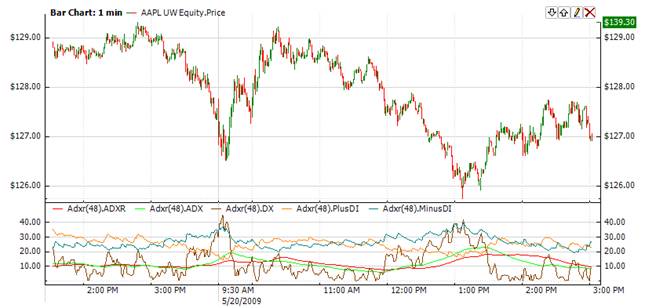Average Directional Movement Rating |
Average Directional Movement Rating Technical Indicator (Adxr) helps to determine if there is a price trend. It consists of five lines: ADX, ADXR, AD, +DI, -DI.
The simplest trading method based on the system of directional movement implies comparison of two direction indicators: the 14-period +DI one and the 14-period -DI. To do this, one either puts the charts of indicators one on top of the other, or +DI is subtracted from -DI. It should buy when +DI is higher than -DI, and sell when +DI sinks lower than -DI.
Also there are “a rule of points of extremum" to eliminate false signals and decrease the numbers of deals. It is used to eliminate false signals and decrease the number of deals. According to the principle of points of extremum, the "point of extremum" is the point when +DI and -DI cross each other. If +DI raises higher than -DI, this point will be the maximum price of the day when they cross. If +DI is lower than -DI, this point will be the minimum price of the day they cross.
The point of extremum is used then as the market entry level. Thus, after the signal to buy (+DI is higher than -DI) one must wait till the price has exceeded the point of extremum, and only then buy. However, if the price fails to exceed the level of the point of extremum, one should retain the short position.














To initialize Adxr indicator use the following constructors:
Adxr - this constructor sets default value of 14 for period.
Adxr(Int32) - sets period of the indicator
Use
properies to get current value
1// Create new instance 2Adxr adxr = new Adxr(28); 3 4// Number of stored values 5adxr.HistoryCapacity = 2; 6 7// Add new data point 8adxr.Add(Bars.Current.Open, Bars.Current.High, Bars.Current.Low, Bars.Current.Close, Bars.Current.Volume, CurrentTime); 9 10// Get indicator value 11double IndADX = adxr.ADX; 12double IndADXR = adxr.ADXR; 13double IndDX = adxr.DX; 14double IndPlusDI = adxr.PlusDI; 15double IndMinusDI = adxr.MinusDI; 16 17// Get previous value 18if (adxr.HistoryCount == 2) 19{ 20 double IndPrevADX = adxr[1].ADX; 21 double IndPrevADXR = adxr[1].ADXR; 22 double IndPrevDX = adxr[1].DX; 23 double IndPrevPlusDI = adxr[1].PlusDI; 24 double IndPrevMinusDI = adxr[1].MinusDI; 25}